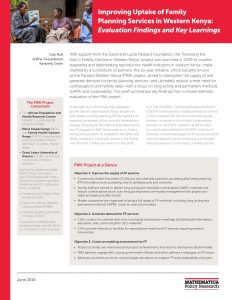
With support from the Packard Foundation, the “Reversing the Stall in Fertility Decline in Western Kenya” project was launched in 2009 to counter stagnating and deteriorating reproductive health indicators in Western Kenya. Implemented by a consortium of partners, this six-year initiative aimed to strengthen the supply of and generate demand for family planning (FP) services—and ultimately reduce unmet need for contraception and fertility rates. This brief summarizes key findings from a mixed-methods evaluation of the project.
In collaboration with Kenya’s Ministry of Health, the project trained 600 Community Health Volunteers (CHVs) to deliver FP services. The evaluation found that CHVs were cost-effectively integrated into existing health system structures and processes, and succeeded in shifting attitudes in support of FP. The ability of CHVs to tailor their approaches to reach different groups–creating safe spaces to meet with young people or women whose husbands or families were not supportive of FP and using informal, unplanned interactions to deliver FP information and commodities–were key to their success.
This evaluation documents valuable contributions of this initiative to FP supply, knowledge and use, as well as the policy environment, resulting from multi-year grants from the Packard Foundation. It also provides key considerations for partners and other stakeholders to sustain important elements and learning from the initiative, after conclusion of the Foundation’s financial support in 2017.







